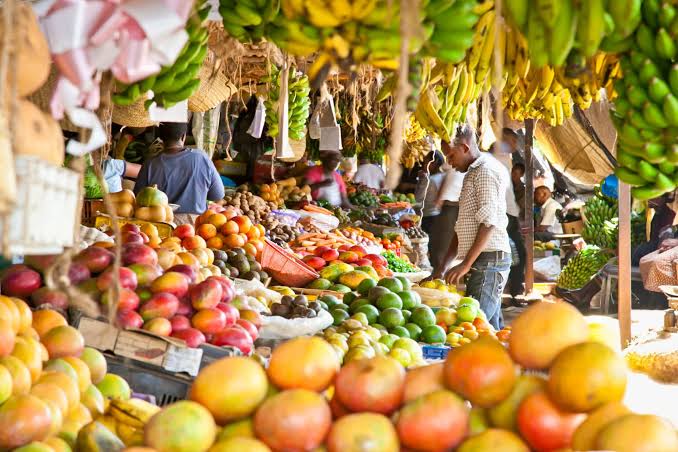In the heart of Nigeria’s evolving wellness movement, a quiet revolution is unfolding, one that reconnects modern health trends with traditional roots. As urban Nigerians embrace clean eating, fitness, and holistic health, local ingredients like ofada rice, tigernuts, millet, okra, moringa, and ugwu (fluted pumpkin leaves) are making a comeback.
These once-overlooked staples are now finding new relevance, and new price tags, in an increasingly health-conscious market.
Join our WhatsApp ChannelGone are the days when healthy eating meant imported kale, quinoa, and almond milk. Today’s FitFam crowd is turning back to indigenous foods, rediscovering their nutritional value and cultural significance. Ofada rice, once considered a peasant’s grain, is now promoted as a brown rice alternative rich in fiber, selenium, and B vitamins. At upscale food stores and wellness cafés, a plate of ofada with sauce can sell for ₦3,000 to ₦5,000, depending on location.
Tigernuts, or “aya,” once sold in wheelbarrows on street corners, are now transformed into bottled “nut milk,” granola add-ins, and healthy snacks. Tigernut milk, touted as a dairy-free, potassium-rich drink, is now a staple in health stores, with a 500ml bottle selling between ₦1,500 and ₦2,500. Similarly, millet and guinea corn are regaining popularity as gluten-free grains used in smoothie mixes and healthy porridges, appreciated for their high fiber content and slow energy release.
READ ALSO: How Wellness Coaches Monetise Meal Plans, Nutrition Advice In Nigeria
Entrepreneurs are leading the charge. Small and medium-sized food businesses are packaging these traditional ingredients with modern branding, clean labeling, health claims, and eye-catching designs. Social media influencers contribute to their popularity by creating content around recipes like ugwu smoothies, moringa soups, or millet pancakes. These efforts have helped reframe local food from “poor man’s diet” to superfood status.
But the resurgence is not purely aesthetic or nostalgic. There’s sound nutritional science backing these foods. Ugwu is packed with iron and antioxidants. Moringa is considered a powerhouse of vitamins and plant protein. Okra supports digestive health. By shifting focus from imported health foods to local alternatives, Nigeria’s wellness industry is both decolonizing food culture and supporting local economies.
The economic impact is worth noting. Farmers who grow these ingredients are beginning to tap into new markets. Demand for organically grown, chemical-free varieties of these crops is increasing, offering premium prices at farm gates. Some urban stores now have entire sections devoted to indigenous wellness products, with prices that reflect both the growing demand and branding efforts.
However, challenges remain. One is consistency in supply and quality. Many local farmers still operate on small scales without access to preservation or packaging technology. Another is the lack of strong regulatory frameworks to ensure quality control and protect against false labeling. For example, not all moringa powders or tigernut milks in the market meet hygienic or nutritional standards, even when branded as “premium.”
READ ALSO: Nigerians Should Adopt Healthy Lifestyle To Curb Diabetes Scourge – Medical Expert
Affordability also continues to be a barrier. Ironically, as these local foods gain “fit” status, their prices in urban markets can become unaffordable for the same communities that once depended on them as staples. A bag of unprocessed ofada rice, for instance, can sell for ₦12,000 to ₦15,000, pricing out lower-income families. There’s a growing concern that wellness may unintentionally widen inequality if access to healthy local foods becomes a status symbol.
Mrs Bolanle, a Lagos-based dietitian, highlighted the nutritional and health benefits of naturally grown foods and plants. “The benefits of eating freshly harvested green vegetables, locally grown rice, and naturally grown and ripened fruits not only promote healthy living but are also cost-effective,” she stated.
Still, the movement offers a blueprint for sustainability. By investing in local ingredients, Nigeria not only boosts its nutrition security but also strengthens agricultural value chains and reduces dependence on imports. The rise of these indigenous superfoods is not just about nostalgia or trend, but about reclaiming health on our own terms.
In the years ahead, the question for Nigeria’s wellness economy will not be whether to embrace local ingredients; that shift is already underway, but how to make them truly accessible, affordable, and beneficial for all.
Amanze Chinonye is a Staff Correspondent at Prime Business Africa, a rising star in the literary world, weaving captivating stories that transport readers to the vibrant landscapes of Nigeria and the rest of Africa. With a unique voice that blends with the newspaper's tradition and style, Chinonye's writing is a masterful exploration of the human condition, delving into themes of identity, culture, and social justice. Through her words, Chinonye paints vivid portraits of everyday African life, from the bustling markets of Nigeria's Lagos to the quiet villages of South Africa's countryside . With a keen eye for detail and a deep understanding of the complexities of Nigerian society, Chinonye's writing is both a testament to the country's rich cultural heritage and a powerful call to action for a brighter future. As a writer, Chinonye is a true storyteller, using her dexterity to educate, inspire, and uplift readers around the world.
- Amanze Chinonye
- Amanze Chinonye
- Amanze Chinonye
- Amanze Chinonye
- Amanze Chinonye
- Amanze Chinonye
- Amanze Chinonye
- Amanze Chinonye
- Amanze Chinonye
- Amanze Chinonye
- Amanze Chinonye
- Amanze Chinonye
- Amanze Chinonye
- Amanze Chinonye
- Amanze Chinonye
- Amanze Chinonye
- Amanze Chinonye
- Amanze Chinonye
- Amanze Chinonye
- Amanze Chinonye
- Amanze Chinonye
- Amanze Chinonye
- Amanze Chinonye
- Amanze Chinonye
- Amanze Chinonye
- Amanze Chinonye
- Amanze Chinonye
- Amanze Chinonye
- Amanze Chinonye
- Amanze Chinonye
- Amanze Chinonye
- Amanze Chinonye
- Amanze Chinonye
- Amanze Chinonye
- Amanze Chinonye
- Amanze Chinonye
- Amanze Chinonye
- Amanze Chinonye
- Amanze Chinonye
- Amanze Chinonye
- Amanze Chinonye
- Amanze Chinonye
- Amanze Chinonye
- Amanze Chinonye
- Amanze Chinonye
- Amanze Chinonye
- Amanze Chinonye
- Amanze Chinonye
- Amanze Chinonye
- Amanze Chinonye
- Amanze Chinonye
- Amanze Chinonye
- Amanze Chinonye
- Amanze Chinonye
- Amanze Chinonye
- Amanze Chinonye
- Amanze Chinonye
- Amanze Chinonye
- Amanze Chinonye
- Amanze Chinonye
- Amanze Chinonye
- Amanze Chinonye
- Amanze Chinonye
- Amanze Chinonye
- Amanze Chinonye
- Amanze Chinonye
- Amanze Chinonye
- Amanze Chinonye
- Amanze Chinonye
- Amanze Chinonye
- Amanze Chinonye
- Amanze Chinonye
- Amanze Chinonye
- Amanze Chinonye
- Amanze Chinonye
- Amanze Chinonye
- Amanze Chinonye
- Amanze Chinonye
- Amanze Chinonye
- Amanze Chinonye
- Amanze Chinonye
- Amanze Chinonye
- Amanze Chinonye
- Amanze Chinonye
- Amanze Chinonye
- Amanze Chinonye
- Amanze Chinonye
- Amanze Chinonye
- Amanze Chinonye
- Amanze Chinonye
- Amanze Chinonye
- Amanze Chinonye
- Amanze Chinonye
- Amanze Chinonye
- Amanze Chinonye
- Amanze Chinonye
- Amanze Chinonye
- Amanze Chinonye
- Amanze Chinonye
- Amanze Chinonye
- Amanze Chinonye
- Amanze Chinonye
- Amanze Chinonye
- Amanze Chinonye
- Amanze Chinonye
- Amanze Chinonye
- Amanze Chinonye
- Amanze Chinonye
- Amanze Chinonye
- Amanze Chinonye
- Amanze Chinonye
- Amanze Chinonye
- Amanze Chinonye
- Amanze Chinonye
- Amanze Chinonye
- Amanze Chinonye
- Amanze Chinonye
- Amanze Chinonye
- Amanze Chinonye
- Amanze Chinonye
- Amanze Chinonye
- Amanze Chinonye
- Amanze Chinonye
- Amanze Chinonye
- Amanze Chinonye
- Amanze Chinonye
- Amanze Chinonye
- Amanze Chinonye
- Amanze Chinonye
- Amanze Chinonye
- Amanze Chinonye
- Amanze Chinonye














